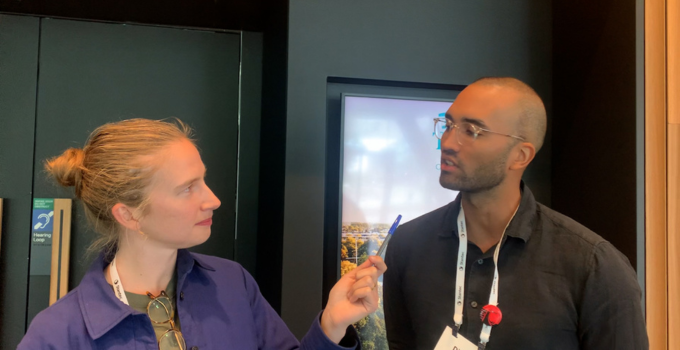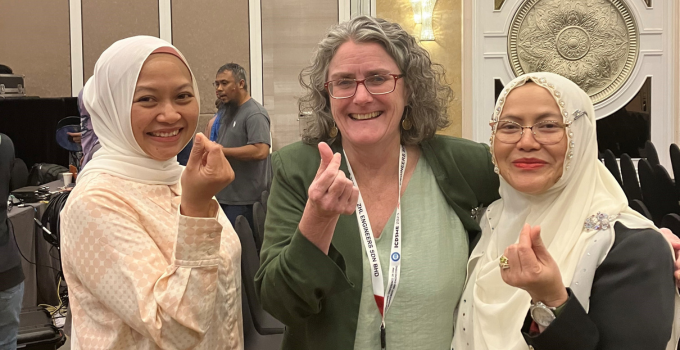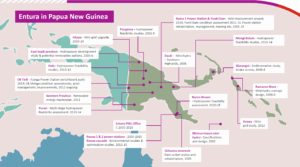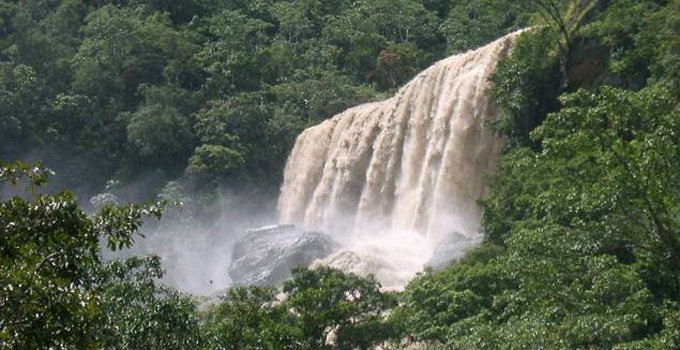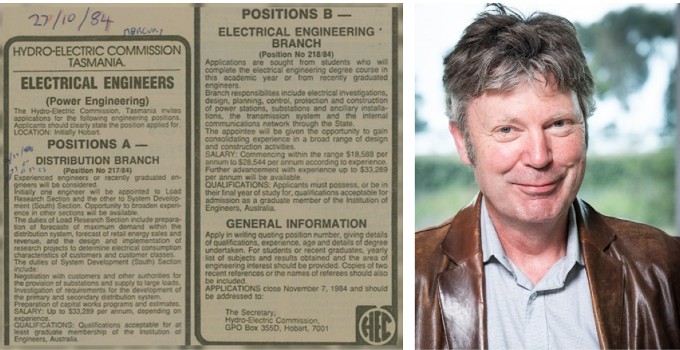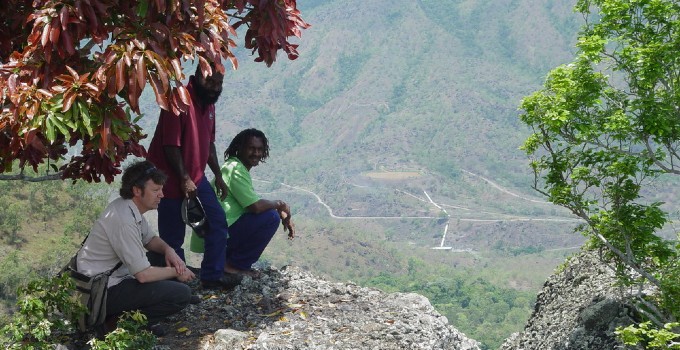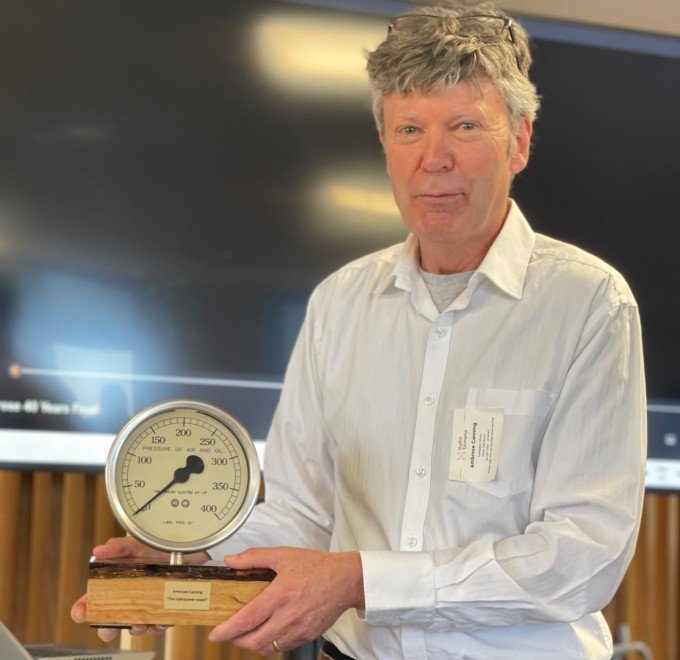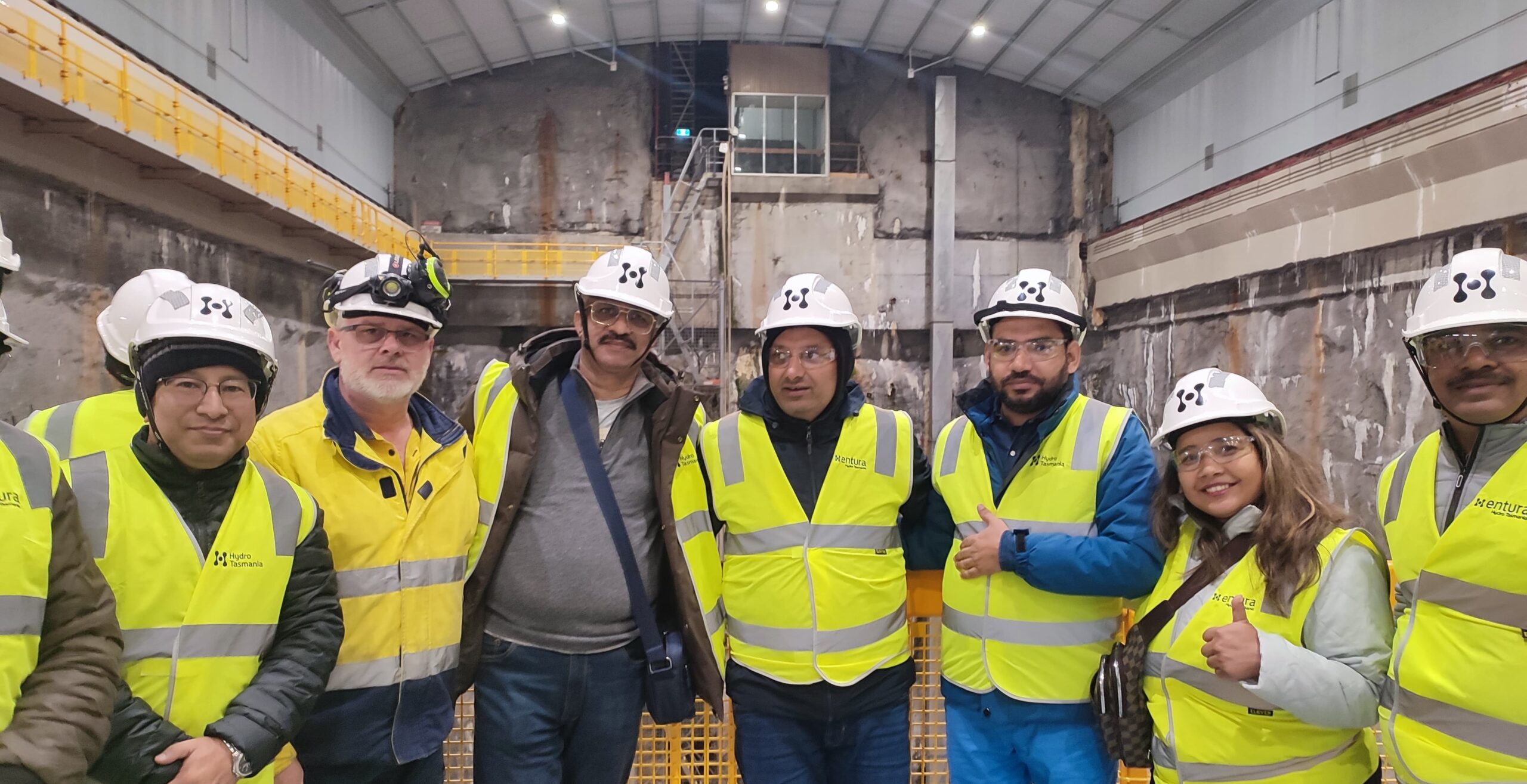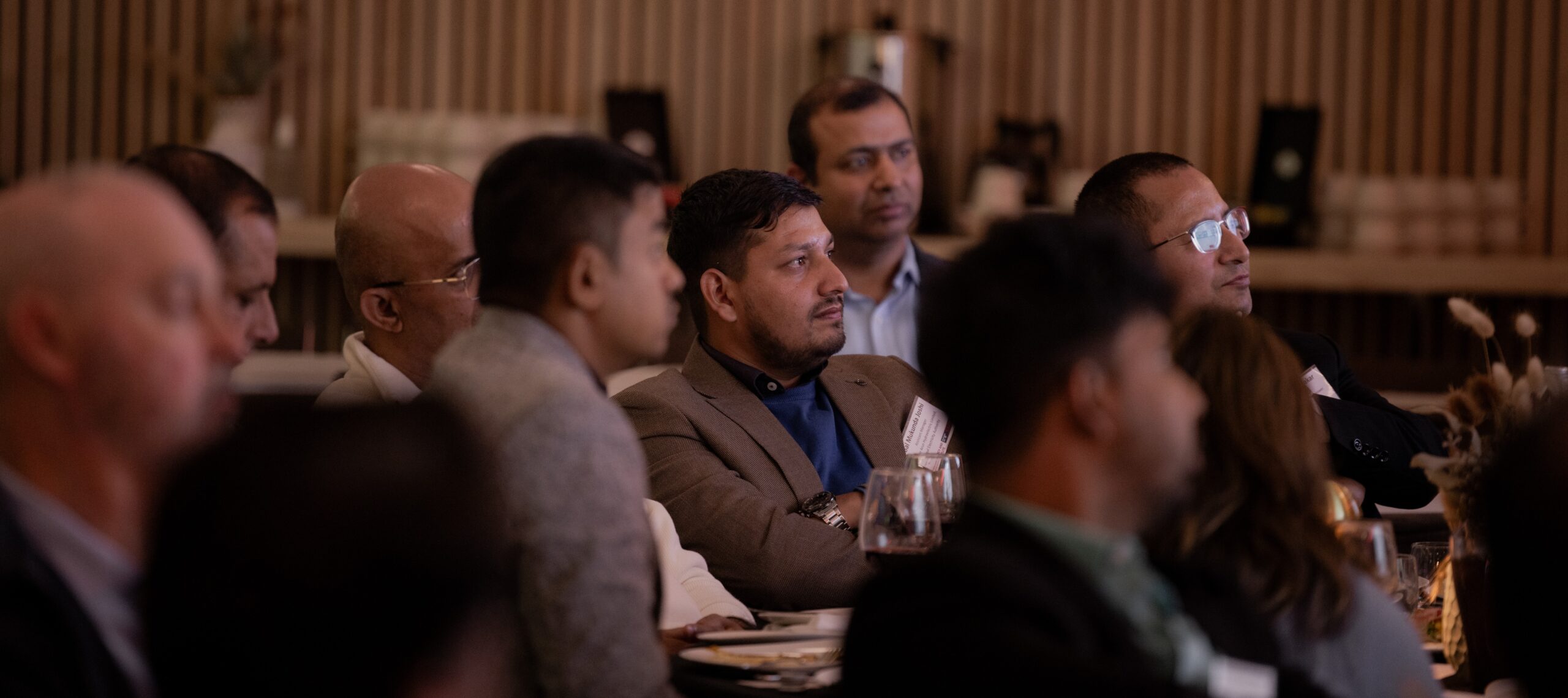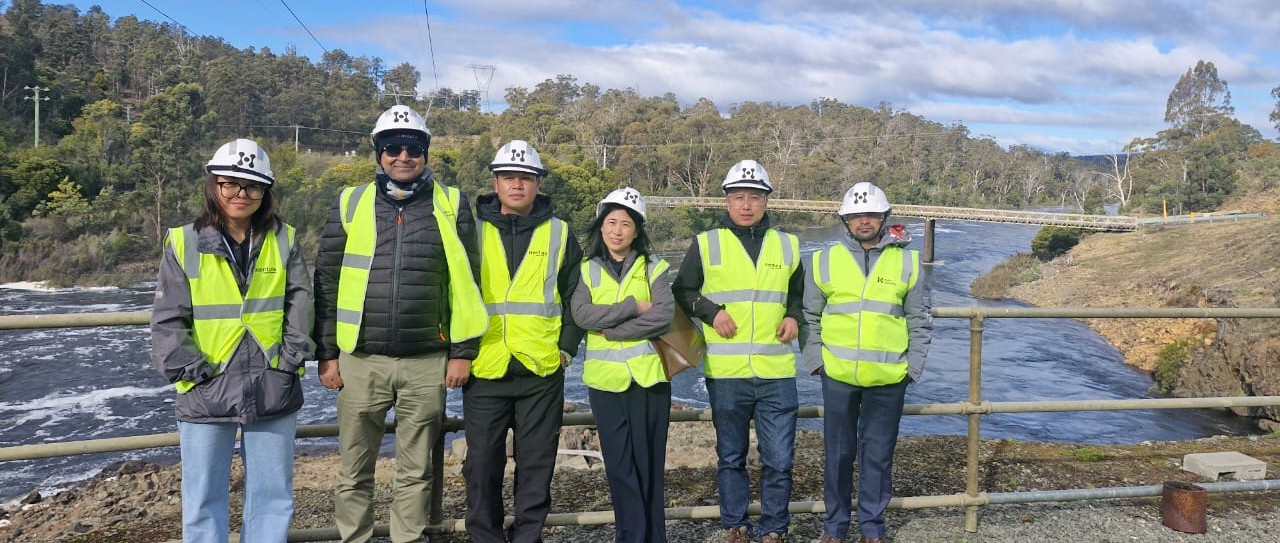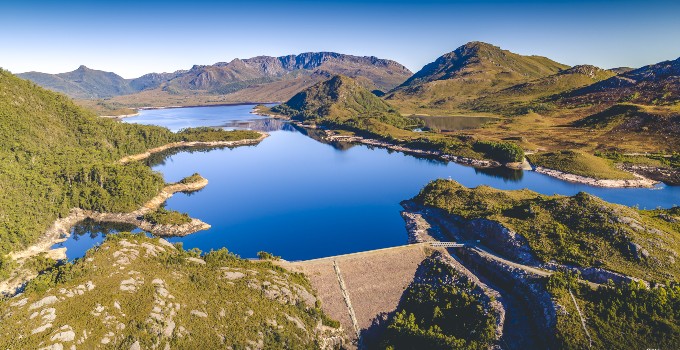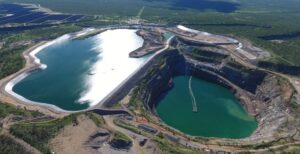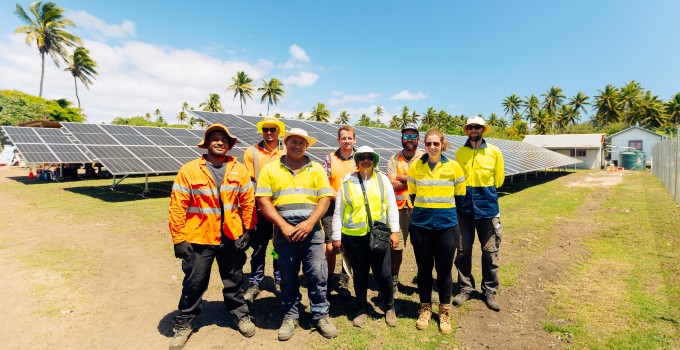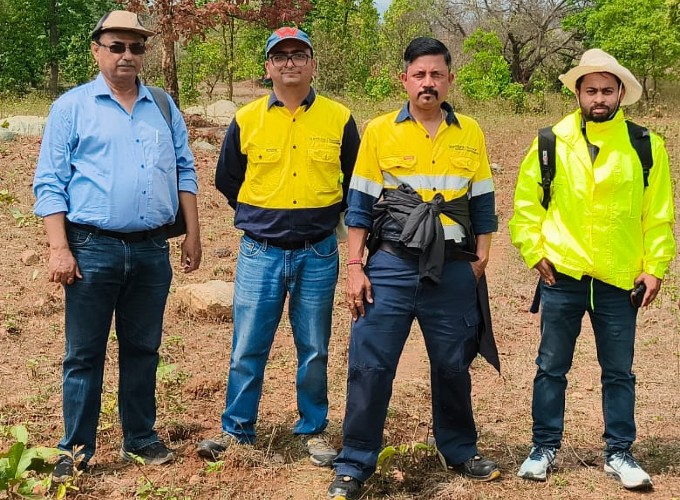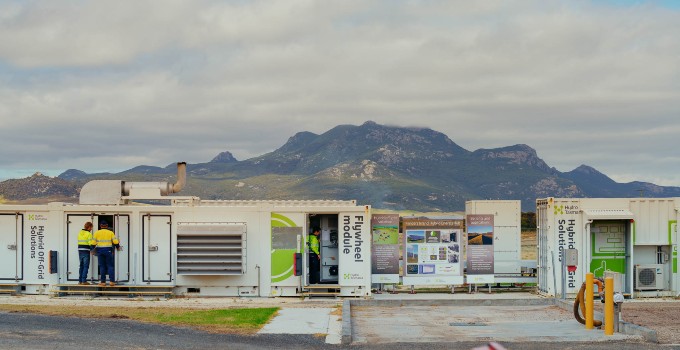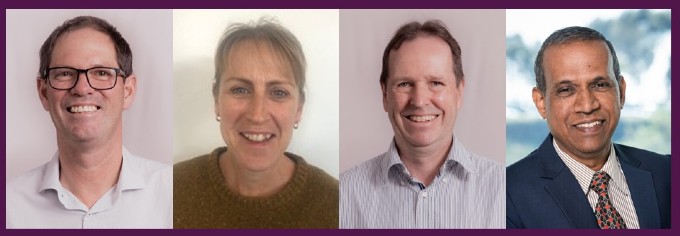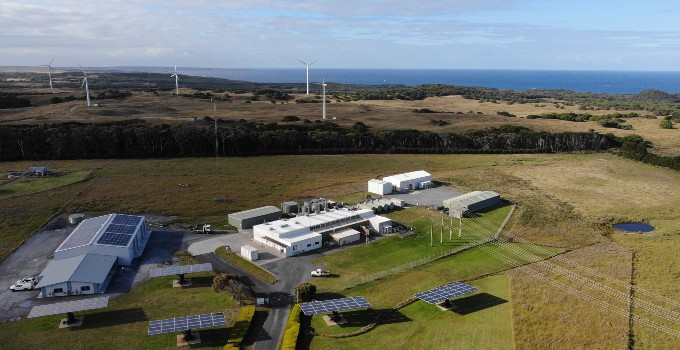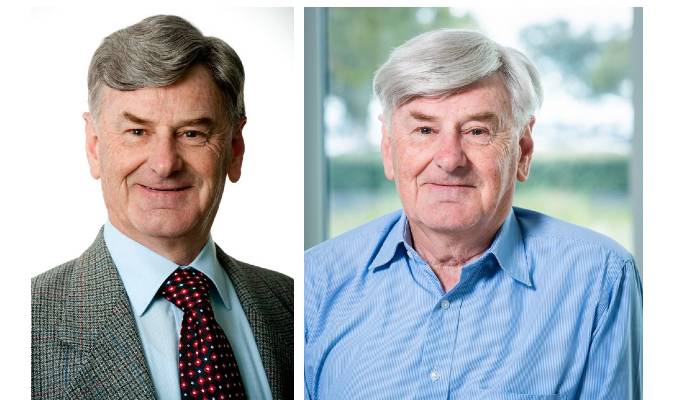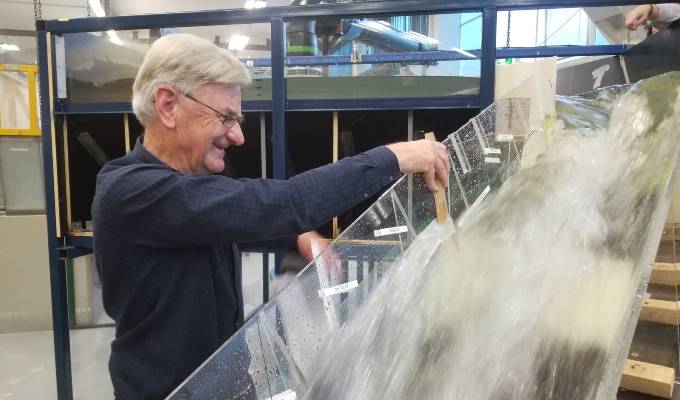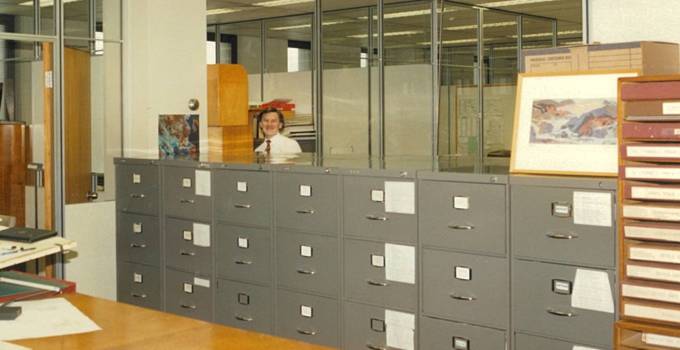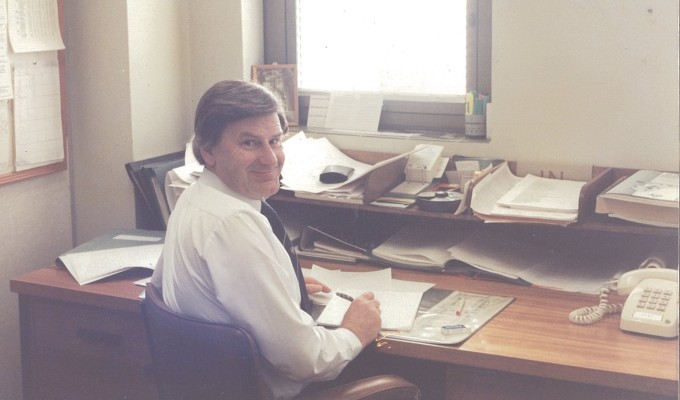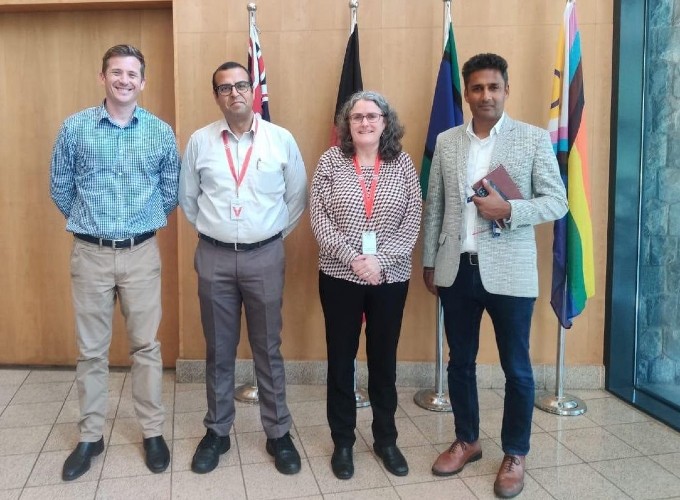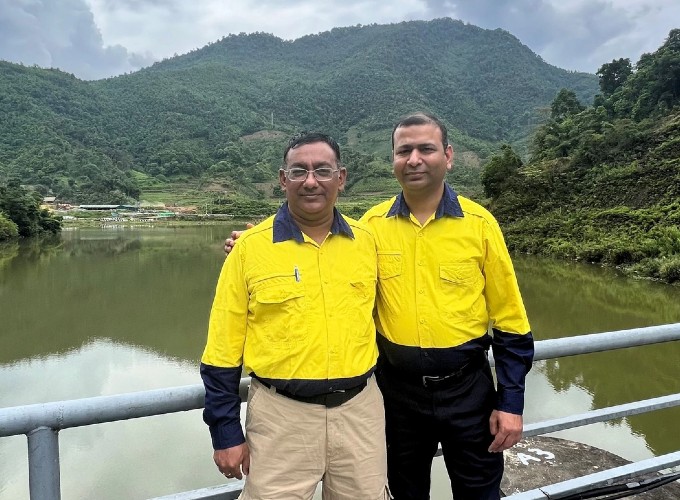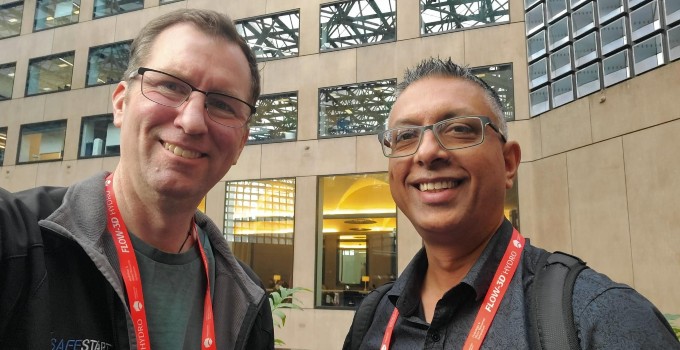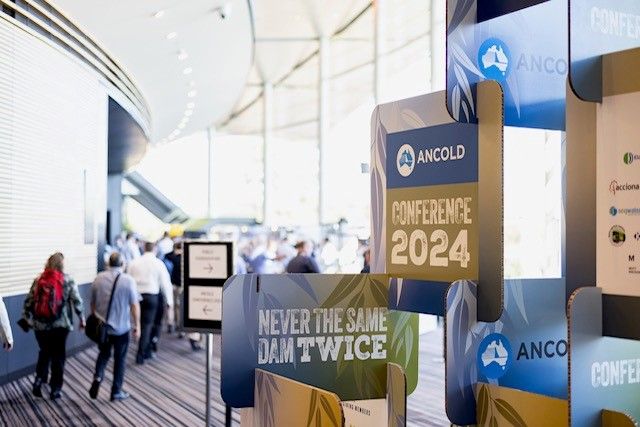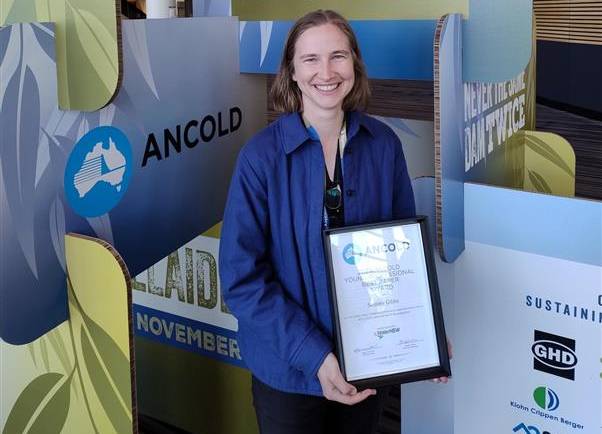Entura’s dams, geotech and water professionals share insights at NZSOLD/ANCOLD conference
A strong contingent of Entura’s dams, geotechnical and water specialists has recently returned from the 2025 combined conference of the New Zealand Society on Large Dams (NZSOLD) and Australian National Committee on Large Dams (ANCOLD), held in Ōtautahi Christchurch, New Zealand.
Over 3 days in November, delegates gathered to share knowledge, challenge thinking, connect with peers and strengthen industry networks.
Collaborating on an embankment dam upgrade
In the ‘Maintenance, rehabilitation and upgrading of existing dams’ session, Senior Engineer Jaretha Lombaard presented ‘Does my berm look big in this? Foundation considerations for Swedish berm design in an embankment dam upgrade’, highlighting Entura’s recent work on a dam upgrade in Tasmania.
Entura’s involvement with this earth and rockfill embankment dam began in 2022 and has recently concluded. Our services included flood studies and hydrological risk assessment, geotechnical investigations and detailed design.
Jaretha noted that collaboration was central to the success of the project and to preparing the paper, which was coauthored with colleagues Paul Southcott (Senior Principal, Dams & Headworks), Sally Fracalossi (Senior Engineer) and Matt Ferguson (Senior Geologist).
Crotty Dam’s innovative design stands the test of time
Richard Herweynen, Entura’s Technical Director Water, presented ‘Crotty Dam’s Innovative Spillway – 30 Years of Performance Providing Valuable Precedent Data to the Industry’ in the ‘Designing and building for the future’ session. This paper, coauthored with Paul Southcott (Senior Principal Dams & Headworks, Entura) and Neil Smith (Principal Engineer Civil Assets, Hydro Tasmania), demonstrated the long-term performance and value of a novel dam spillway design.
“The Crotty Dam project was the first time that a spillway was incorporated into the body of a concrete-faced rockfill dam, with the crest and chute over the downstream rockfill face,” said Richard.
“The design was unprecedented, but was based on extensive concrete-faced rockfill monitoring data at the time. With over 30 years of operational and monitoring data now, it has proven itself over many years, including through significant spill events. It’s important to share this data with our professional community to build a body of precedent, as well as guidance and limitations, that dams professionals can draw on in future projects.”
Latrobe flood mitigation builds resilience
In the ‘Flood hazard, flood adaptation and climate resilience’ session, Entura’s Senior Principal Water, Colin Terry, presented ‘Latrobe Tasmania levee: lessons for successful flood mitigation’.
His paper outlined Entura’s role in designing and delivering a flood mitigation for the town of Latrobe in Tasmania, which suffered significant impacts from a flood in 2016. Entura’s involvement over 8 years encompassed flood studies, preliminary design, surveying, geotechnical investigations, environmental assessments, approvals support and detailed design.
“Our expertise in flood management and civil design, coupled with flexibility and positive partnerships, delivered a successful solution: a levee and diversion culvert that strengthens Latrobe’s resilience and will reduce risk to property and lives,” said Colin.
Failure modes key to instrumentation solutions
In the conference’s ‘quickfire presentations’, Graduate Engineer Diego Real Diaz shared ‘Staged Surveillance and Instrumentation Upgrades for Three Embankment Dams Using a Risk-Based, Failure-Mode-Focused Approach’.
Commenting on his first conference presentation, Diego said: “Even when dams are of a similar type, a uniform one-size-fits-all instrumentation upgrade approach is not necessarily the best solution. We definitely need to understand the controlling failure modes to propose upgrades that provide the best solution for our clients.”
Sharing knowledge, building connections
Entura’s Senior Principal Dams & Headworks, Paul Southcott (who is also convening the ANCOLD working group on dam instrumentation and monitoring guidelines), said he was impressed by the technical excellence and thought-provoking nature of this year’s presentations.
“That’s the key thing with a conference like this,” said Paul. “It is so important to really get people thinking and inspired by the projects discussed.”
Entura’s Managing Director, Amanda Ashworth, said she is proud that Entura played such an active role, including sponsoring 3 technical sessions.
“It’s fantastic to see our specialists contributing to important discussions about dam design, instrumentation and flood mitigation. This annual conference is vital for strengthening connection and capability, promoting best practice and fostering innovation across the dams sector. This is what will drive resilient dams and water infrastructure that can serve communities safely for generations, whatever the climate future holds.
“We’re thrilled that the next ANCOLD conference will be held in Tasmania, and we look forward to connecting with our industry peers and valued clients again then.”
Entura Managing Director Amanda Ashworth celebrates 25 years with the business
Entura’s Managing Director, Dr Amanda Ashworth, marks 25 years with the power and water consulting business this month, having joined Hydro Tasmania Consulting (which later became Entura) in 2000.
Amanda’s service milestone highlights her depth of experience and her ongoing passion for Entura’s purpose and projects.
Over the decades, her career has spanned technical, commercial and leadership roles, beginning as a senior environmental consultant. She progressed to a team leader, then a business development manager, sales program manager, strategy manager, and Director of Strategy, Sales & Commercial. She was appointed Managing Director in March 2024.
Over the years, Amanda has developed deep institutional knowledge and built strong relationships with clients, partners and professional networks in Australia and internationally.
Amanda has long championed capacity-building as a foundation for long-term sustainability of power and water projects. She has remained at the forefront of Entura’s knowledge-sharing initiatives, particularly through her leadership of the Entura clean energy and water institute (ECEWI). As the director of ECEWI, she has driven new training programs, partnerships and client engagements, helping to build local skills and capability in renewable energy, dam safety, and environmental management across the Indo-Pacific region.
She has also advocated for increased gender equity in the sector and is a generous supporter and mentor of emerging female leaders.
Amanda (centre) with Professor Datin Ir. Dr Lariyah Bte Mohd Sidek and Ir. Dr. Hidayah Bte Basri (at the second International Conference on Dam Safety Management and Engineering hosted by the Malaysian National Committee on Large Dams in 2023), both of whom have been long-term colleagues of Entura and ECEWI since undertaking training in Tasmania in 2015
Reflecting on her 25 years with the business, Amanda said: “I feel very fortunate to have spent most of my career at Entura, constantly developing my skills through new opportunities, working with exceptional colleagues, and partnering with clients on projects that improve lives and make a very meaningful contribution to the clean energy transition.”
At a celebration of the milestone, Donald Vaughan, Entura’s Technical Director Power, paid tribute to Amanda, noting her deep curiosity and problem-solving approach, and her genuine interest and concern for people – not only Entura’s employees, but also clients, contractors and particularly the participants in ECEWI’s training courses and capacity-building initiatives.
Outside Entura, Amanda is the Chair of the Board of the Association for Children with Disability (Tas.). She is a mother of teenage twins, balancing her busy career with family life in Tasmania.
Amanda has written or presented more than 25 academic journal articles and conference papers. She was an early contributor to the development of the International Hydropower Association’s development of its Sustainability Guidelines and Compliance Protocol, and led a major update of the Australian wind industry’s best-practice guidelines.
She gained her doctorate with a dissertation on social, economic and political reform in Lithuania, which was followed by a postdoctoral fellowship in the United Kingdom, focused on managing risk and perceptions of risk in the chemical and nuclear industries. She then returned to Tasmania, working for the Department of Infrastructure, Energy and Resources and then the Office of Energy Conservation and Planning.
Marking 40 years of supporting renewable energy and building capacity in Papua New Guinea
For four decades, Entura has been working alongside Papua New Guinea’s hydropower operators to keep the lights on – and now we’re helping power the future with solar and battery mini-grids in remote areas.
As Papua New Guinea celebrates 50 years of independence, we’re proud to celebrate 40 years of collaboration.
(Click on image to enlarge)
Our relationship with PNG began in the mid-1980s, when PNG Power personnel first began coming to Tasmania on secondments to train with Hydro Tasmania’s portfolio of hydropower assets. This program built strong relationships between PNG Power and Hydro Tasmania, making Entura (Hydro Tasmania’s consulting arm) a natural choice of hydropower consultant to strengthen and modernise PNG’s hydropower assets over many decades.
It’s now approximately 20 years since Entura significantly lifted our in-country presence and hydropower support in PNG, continuing to work with PNG’s existing hydropower assets but also opening an office in Port Moresby as a base to explore the potential for new hydropower developments.
“In the early to mid-2000s, we really intensified our on-ground work in PNG,” says Dr Amanda Ashworth, Entura’s Managing Director. “Our people explored the feasibility of many potential opportunities for new hydropower schemes, but we also continued providing substantial technical support for refurbishment, operations and management of some of PNG’s most significant power stations to improve safety, availability and reliability, and extend the useful life of these important assets.”
Hydropower – the backbone of PNG’s power
Papua New Guinea is one of the least electrified nations in the world: only about 20% of its population of roughly 10 million currently have reliable electricity, with most supply concentrated in urban areas. PNG is aiming for 70% electrification by 2030 – a bold target that will transform lives.
Hydropower naturally plays a central role: PNG is richly endowed with high rainfall and mountainous catchments. However, by the 2000s, the existing hydropower stations were challenged by issues such as sedimentation, deteriorating infrastructure, limited safety systems and difficulties accessing spare parts. These are precisely the kinds of challenges Entura has helped address – and that we continue to support.
One of Entura’s achievements is working on the Ramu 1 Power Station in PNG’s Eastern Highlands. With some of the plant’s generators installed in the 1970s, breakdowns and operating restrictions had caused the plant’s output to fall. Our multi-year and multi-disciplinary involvement – stretching from initial condition assessment through to Owner’s Engineer services – helped restore and upgrade performance, reliability and availability.
Likewise, aging stations such as Rouna 2 and Ok Menga (which powers the Ok Tedi mining operation) have benefited from modernisation, more rigorous maintenance, safety upgrades and support in risk and asset management.
A number of projects have extended over many years, so Entura knows these hydropower assets intimately, enabling us to advise on asset management, modernisation and refurbishment.
Building local capacity for true sustainability
Capacity-building has been a key focus of Entura’s services in PNG.
“For genuine sustainability, infrastructure needs skilled people to run it and maintain it into the future,” says Amanda. “Our specialists have worked side-by-side with PNG Power Limited, Ok Tedi Mining and other local operators, often living or working in PNG for long periods, to foster local capability to run and care for hydro assets in challenging circumstances,” she says.
As well as providing on-the-ground mentoring in embedded roles in key power stations, Entura has delivered tailored short courses through our training institute, ECEWI, extending from hydropower operations and asset management to dam safety and holistic catchment management.
From hydropower to hybrids
As PNG pushes toward its 2030 electrification targets, the combination of hydropower renewal plus new hybrid renewable systems holds promise.
PNG has many remote and island communities that aren’t serviced by grid electricity. In these areas, hybrid renewable systems – combining hydro when available, solar, battery storage and diesel or other backup – offer resilient solutions that reduce reliance on expensive diesel fuel and lessen carbon emissions.
Entura is excited to be part of this new energy frontier in PNG, says Amanda, given Entura’s commitment to supporting Australia’s Pacific neighbours to extend electrification and achieve their clean energy targets.
“We are very active across the Pacific in hybrid renewable systems, both on grid and off grid, drawing on the strong foundation of our long-term involvement with the world-leading remote hybrid systems established by Hydro Tasmania on King Island and Flinders Island in Bass Strait,” says Amanda.
“Now, we’re applying that innovation and technical insight across the Indo-Pacific region, including in Tonga, Federated States of Micronesia, Tuvalu, Cook Islands, Solomon Islands, Marshall Islands and Maldives,” she says.
In recent years in PNG, Entura has been engaged as technical consultant through the Economic and Social Infrastructure Program (ESIP), funded by Australia’s Department of Foreign Affairs and Trade, to oversee the design, supply and installation of solar PV, batteries and a control system to upgrade the Aitape mini-grid. The upgraded hybrid system is expected to deliver 56.5% renewable energy with on average 11.5 hrs of ‘diesel-off’ per day, reducing the cost of electricity generation and providing a modern, safe and reliable power source for Aitape.
“With our long-term experience of maintaining and upgrading Tasmania’s hydropower assets, our formal training institution (ECEWI), and our broader regional work in flexible, resilient hybrid renewables and off-grid systems, Entura is well placed to continue supporting PNG as it strives to meet its electrification and clean energy goals,” says Amanda.
“We look forward to many more decades of partnering with our valued clients in PNG.”
Read our case studies and articles about Entura’s successes in PNG
Hydropower rehabilitation, modernisation and asset management
- Ramu 1 Hydropower Station (Eastern Highlands): From around 2005–15, Entura worked on condition and risk assessment, refurbishment, upgrades, reservoir sedimentation assessment, hydrology, hydraulic testing, load flows, etc.
- Rouna 2 Hydropower Station (Laloki River cascade): An underground station from the 1960s, operating with many safety hazards (single exit route, flood/fire/smoke risks etc.). Entura led a project to upgrade and modernise it (2005–09), replacing and refurbishing generators, installing controls, safety systems, ventilation, fire protection, emergency exits, etc. Read more about our work in this thought leadership article.
- Ok Menga (Ok Tedi Mining Limited): Entura has been involved in rehabilitation and asset management to maintain the station which supplies ~75% of the power for the mine and township. Because of isolation, outage consequences are high; diesel replacement is costly and lost production from the mine is in the order of hundreds of thousands of dollars per day of outages. Entura’s work has included extensive condition assessments, risk mitigation, urgent remedial actions, planning ‘quick wins’, and importantly, building the capability of local staff. Read more about our work in this thought leadership article.
Hydropower optimisation and feasibility studies
- Cascade management of the Rouna Scheme: Entura carried out comprehensive modelling, inflow forecasting, energy generation software, feasibility for upgrades and new stations (e.g. Rouna 5), dam safety assessments, spillway upgrade proposals etc.
- Mongi-Bulum hydropower project (Morobe Province, 2013-14): Entura assisted PNG Power Limited with a pre-feasibility study of a new 116 MW hydropower scheme. Tasks included site selection, geological reconnaissance, flow and energy assessments, cost estimates and economic analysis.
- Hela hydropower project (Hela Province, 2013-14): Entura undertook a feasibility assessment for a new 167 MW hydropower project. The layout included dam, tunnels, shaft, and an underground station.
- Naoro Brown project (Port Moresby region, c2010-15): Feasibility studies to supply new renewable generation capacity to Port Moresby (reducing reliance on diesel) via hydroelectric generation. Included hydrological and geotechnical studies, system modelling, headrace tunnels, etc.
- Purari River hydropower scheme: Entura was part of a consortium (led by AECOM) that conducted feasibility, environmental and social impact studies for a very large hydropower scheme (>2,000 MW) on the Purari River.
Entura farewells ‘quiet achiever’ Ambrose Canning after 40 years of hydropower excellence
After notching up an impressive 4 decades with Hydro Tasmania, Hydro Tasmania Consulting and Entura, a long-serving self-described ‘quiet achiever’ is retiring. Ambrose Canning, Entura’s Principal Consultant, Mechanical Engineering, has made a profound impact on hydropower in Tasmania, Papua New Guinea, Sarawak and beyond – and a lasting impact on his colleagues.
Ambrose’s original job advert from 1984
Ambrose is proud of having worked on the last of the big new hydropower schemes in Tasmania in the 1980s and 1990s – helping keep the lights on for Tasmanians and power the state’s future. Since then, he’s supported hydropower projects across Australia, New Zealand, Malaysia, India, Nepal, the Philippines, Indonesia – and, most notably, Papua New Guinea.
In PNG, Ambrose made significant contributions over many years: exploring the feasibility of new hydropower developments, supporting the modernisation of the Rouna and Ramu power stations, increasing safety for power station workers, and sharing knowledge to build capacity.
Ambrose (L) at Hombrom Bluff, PNG in 2005
Ambrose’s colleagues have appreciated his technical excellence, generous knowledge sharing and encouragement, and unwavering patience, composure and integrity.
Leigh Smith, who has worked closely with Ambrose for the full 40 years, describes Ambrose as setting the standard for mechanical engineers, especially in the design space, and having played a key role in building Entura’s respect among clients. Through his mentoring of other Entura engineers, he has ensured that Entura will maintain that esteem and continue to deliver excellence and value to our hydropower clients.
Ambrose’s award-winning Kunzea ambigua bonsai
Retirement for Ambrose promises more time to do more of what he loves: gardening, bonsai, and outdoor activities including volunteering at the Mt Mawson ski slopes (Mt Field, Tasmania).
“Ambrose has made a wonderful contribution to our business, our culture, our people, and to clients and communities throughout our regions,” says Amanda Ashworth. “He’s been an excellent mentor, technical expert, and generous, reliable presence over many years. Congratulations, Ambrose on your 40 years with Entura. We wish you all the best for a very happy, healthy and fulfilling retirement.”
Ambrose at his farewell, with one of his gifts: a pressure valve from Trevallyn Power Station
Entura bids farewell to SARIC delegation after a successful dam safety training program
The Entura clean energy and water institute (ECEWI) is celebrating the success of its latest dam safety training program for an international delegation. Over the last two busy weeks, 23 engineers with roles in water and hydropower organisations from the government and private sector in Pakistan, Bhutan, Nepal, Sri Lanka and India have taken part in Entura’s tailored dam safety course.
This latest training course was supported by the Australian Department of Foreign Affairs and Trade (DFAT) as part of the South Asia Regional Infrastructure Connectivity (SARIC) initiative implemented by the World Bank, IFC and Palladium.
The group travelled to Hobart, Tasmania for the program, which combined classroom learning with on-site visits to major hydropower facilities, including the Repulse, Craigbourne, Cethana, and Gordon dams, the Ridgeway Reservoir, and the Cethana and Gordon power stations.
In addition to the technical learning, networking and establishing mutually beneficial cross-country relationships is a key focus of the SARIC initiative. This is a much-anticipated highlight for the delegates, and we certainly didn’t disappoint. ECEWI held an introductory networking event, a cruise in Hobart’s harbour and several other events enabling participants to form valuable international relationships.
Over the course of two weeks, our delegates were taught industry-leading dam safety principles and practices from some of Entura’s most experienced dam specialists.
“We’ve once again delivered impactful learning experiences that support capability building across regions through Entura’s dedicated training arm,” said ECEWI Program Coordinator, Leesa deGroot.
“Participants not only gained invaluable skills to support capability building within their organisations and regions but also had the opportunity to connect with key dam asset owners in Tasmania and build lasting international networks. A huge thank you to all involved — from our expert facilitators to the enthusiastic participants who made this program such a success.”
Reflecting on just one of the days, Mr Muhammad Zain, Assistant Executive Engineer at the Water and Power Development Authority, said: “Today’s session was very insightful and well-organised. The morning module on surveillance, monitoring, and inspection provided clear guidance on instrumentation, inspection, planning and reporting. The practical exercise was a great way to reinforce learning. The afternoon session on the geological context of South Asia was engaging and highly relevant, offering valuable perspectives on regional geology, seismicity and dam safety challenges. Overall, it was a very productive and well-balanced day of training. Thank you.”
Another participant, Mr Nidup Dorji, Chief Engineer at Khorlochhu Hydro Power Ltd, said: “The sessions were excellent and technically very informative. I only wished there had been more time. But it was truly enriching to discover that there are different ways of doing things beyond what we are used to.”
Reflecting on this latest dam safety training program, Dr Amanda Ashworth, Entura’s Managing Director, commented, “It’s such a pleasure to host another SARIC training program with an inspirational group of engineers and executives who have a real dedication to their disciplines, organisations and their countries. They come with a passion and a high level of engagement that brings mutual learning for everyone involved, including our trainers. It is these opportunities for people-to-people connections in the South Asia region, and between those countries and Australia, that provide a foundation for ongoing knowledge sharing and collaboration.”
Entura has delivered training through ECEWI for over ten years. During that time, it has delivered around 180 training programs to power and water clients in Australia and internationally. This includes dam safety training for the Malaysian National Committee on Large Dams (MYCOLD), dam safety training for local Tasmanian utilities, and close relationships with Bangkok’s Asian Institute of Technology (AIT) and Kuala Lumpur’s Universiti Tenaga Nasional (UNITEN), among others.
Find out more about Entura’s customised training offerings here. Learn more about the SARIC program through their website and LinkedIn. SARIC is funded by the Australian Government and is implemented by the World Bank, IFC, Palladium and ASI. Training and networking services under SARIC are managed by Palladium.
Entura welcomes SARIC delegation for dam safety training
Entura is delighted to continue our support for the South Asia Regional Infrastructure Connectivity (SARIC) initiative of the Australian Department of Foreign Affairs and Trade (DFAT). This training marks our fourth collaboration under SARIC and the second time we’ve delivered dam safety training to participants from the South Asia region.
SARIC is a $32 million initiative funded by the Australian Government since 2020 and is implemented by the World Bank, IFC and Palladium, with the shared objective of strengthening regional infrastructure and connectivity across South Asia.
Over the next 2 weeks, the Entura clean energy and water institute (ECEWI) will be providing training to 23 engineers from Pakistan, Bhutan, Nepal, Sri Lanka and India.
The participants will gain knowledge of leading practices in dam safety, including risk assessment and management, inspection and monitoring techniques, emergency preparedness, and infrastructure development for safe and sustainable dam operations. In addition, participants will learn about pumped hydro energy storage and the implications of climate change. They will have the opportunity to see how Hydro Tasmania manages dam safety and maintains its water and power assets, with visits to a selection of Tasmanian dams and power stations.
Entura’s senior dam safety specialists will deliver the training sessions along with guests from across the dam and energy sectors.
“Our people are specialists in dam safety and the opportunity to deliver this training is a testament to their skills and knowledge,” said Entura’s Managing Director, Dr Amanda Ashworth. “Dam safety is as important as ever for a successful and sustainable clean energy transition, securing communities and assets into the future.”
Entura has provided training through ECEWI for over ten years. During that time, ECEWI has delivered more than 146 training programs to power and water clients in Australia and internationally. This includes dam safety training for the Malaysian Committee on Large Dams (MYCOLD), dam safety training for local Tasmanian utilities, and close relationships with Bangkok’s Asian Institute of Technology (AIT) and Kuala Lumpur’s Universiti Tenaga Nasional (UNITEN), among others.
Find out more about ECEWI’s customised training offerings here.
AFRY and Entura develop collaboration to support offshore wind opportunities
Australian power and water consulting business Entura has entered a collaboration with AFRY, a European leader in engineering, design and advisory services. Together, AFRY’s global offshore technical expertise and Entura’s extensive experience on local Australian power projects will help support Australia’s emerging offshore wind industry. AFRY and Entura aim to support offshore wind farm feasibility licence holders that intend to bid in Victoria’s offshore wind auction process. Victoria has set goals of 2 GW of offshore wind by 2032, 4 GW by 2035 and 9 GW by 2040.
The Victorian Government has granted 11 feasibility licences off the coast of Gippsland. The region is expected to host Australia’s first operational offshore wind farms in the early 2030s, helping achieve Australia’s clean energy targets and net zero ambition.
The Victorian Government will hold an offshore wind auction in which only feasibility licence holders are eligible to bid for a Contract for Difference (CfD). The CfD is expected to provide a guaranteed long-term revenue contract, with details on pricing and assessment criteria to be confirmed once the tender rules are released.
No offshore wind farms have yet been built in Australian waters; however, the technology is used extensively in Europe and Asia and is emerging in North America. The first offshore wind farm was built in 1991 in Denmark, paving the way towards the current global installed capacity of 85 GW.
Petteri Härkki, AFRY’s Acting Head of Renewables & Energy Storage, commented: “Australia’s offshore wind energy potential is vast and AFRY is actively expanding its Australian presence in renewable energy, working on a number of important projects in the country. AFRY is a leading advisor in international offshore wind auctions and offshore wind development, with proven expertise working in offshore wind in about 30 countries around the world. AFRY’s in-depth knowledge of offshore wind auction mechanisms and our track record of helping our clients to win bids and develop their projects position the new AFRY–Entura collaboration as an ideal support for the Australian offshore wind market. Altogether, AFRY has been involved in more than 90 GW of offshore and onshore wind projects worldwide as Technical Advisor and Commercial/Market Advisor.”
Entura will support AFRY to navigate Australian regulatory frameworks and requirements, providing the critical local insight to engage effectively with stakeholders and meet regional expectations. Entura’s services will include tailored bid support, drawing on the business’s extensive experience in regulatory submissions, local grid and environmental approval requirements, and renewable energy engineering design in Australia.
AFRY brings significant international offshore wind experience and proven methodologies. It will provide technical expertise, cost analysis, site characterisation, due diligence and package management.
“We are excited to contribute our local insights and broad experience of renewable energy technology and grid integration to support this new frontier for Australia’s sustainable energy future,” said Dr Amanda Ashworth, Entura’s Managing Director.
“As part of Hydro Tasmania, Entura has been at the forefront of renewables since the beginnings of hydropower in Tasmania more than a century ago. We were integral to Tasmania’s first wind farms and the world-leading, innovative hybrid renewable projects on remote King and Flinders islands in Bass Strait. We’re proud to share what we’ve learnt from our work in Australia and across the Indo-Pacific and we’re eager to keep learning more as we work with international businesses like AFRY.”
Pictured: Petteri Härkki. Regional Director Asia, Renewable Energy and Thermal Power, President AFRY Philippines
Interested in learning more?
Visit https://afry.com to explore how AFRY supports the global energy transition through innovative and sustainable engineering solutions.
Visit www.entura.com.au to learn how Entura creates safe and sustainable power and water solutions.
Entura’s Paul Southcott appointed as convenor of new ANCOLD working group
In an initiative of the Australian National Committee on Large Dams (ANCOLD), Entura’s Paul Southcott (Senior Principal – Dams and Headworks) has been appointed as Convenor of the newly formed ‘Guidelines for Dam Instrumentation and Monitoring Systems Working Group’.
The working group will support the development of updated ANCOLD guidance on dam instrumentation and monitoring practices. Paul will lead the group through its initial planning and development phase, establishing the foundational framework for the guidelines and progressing their development through to publication.
“With nearly four decades of experience in civil and dam engineering, Paul will bring an exceptional depth of technical knowledge and extensive industry experience to this role,” said Dr Amanda Ashworth, Entura’s Managing Director. “We are very proud to see Paul appointed to this role and given the opportunity to share his profound knowledge with colleagues across the Australian dams industry.”
Paul said, “ANCOLD plays a crucial role in facilitating knowledge sharing, building the capability of dams professionals, and formulating the industry guidance that advances excellence in technical practice and management of dams. I’m excited to guide the Working Group so that together we can make a meaningful contribution to the long-term safety and sustainability of Australia’s dams, many of which are truly intergenerational assets.”
“Thanks to robust dam safety standards and ANCOLD’s guidance, dam catastrophes are rare in Australia; however, safety must remain every dam owner’s key concern,” said Paul. “Ensuring that dams have the appropriate instrumentation and monitoring for their potential failure modes is fundamental for keeping dams safe. It is also a key input into keeping all the components of the dam operating as intended and achieving their intended lifespan.”
Paul’s expertise is a crucial part of Entura’s ongoing support for dam upgrade and safety works for Hydro Tasmania’s and TasWater’s extensive dam portfolios. He has also contributed to many major dam and hydropower projects throughout Australia and the Indo-Pacific region, including for Snowy Hydro and numerous councils and water utilities including SeqWater, Sun Water and SAWater.
Paul was named Tasmania’s Professional Engineer of the Year in Engineers Australia’s 2021 Engineering Excellence Awards.
He is passionate about furthering the engineering profession through knowledge sharing and has authored numerous conference papers and journal articles for national and international forums.
His latest thought leadership article is ‘Planning for the Future: The Challenges of Dam Inspection and Maintenance’. He has also written articles on the business risks of small dams and weirs, the importance of maintaining quality long-term records, the benefits of dam portfolio risk assessment, and using risk assessment to guide dam safety upgrades.
Entura’s pumped hydro expertise in the spotlight
The latest issue of International Water Power and Dam Construction magazine is out – with a special focus on pumped hydro energy storage.
In the issue, Entura’s Richard Herweynen (Technical Director Water) and Nick West (Principal Engineer Civil) discuss our latest pumped hydro projects, through which we are furthering the storage needed to accelerate the renewable energy transition.
We’re excited by the global resurgence of interest in the potential of pumped hydro and will attend the International Forum on Pumped Storage Hydropower in Paris in September, hosted by the International Hydropower Association, of which we were a founding member.
The article in International Water Power and Dam Construction magazine features Genex’s Kidston Pumped Storage Hydro Project in far north Queensland, for which Entura worked on the feasibility study and is currently serving as Owner’s Engineer during construction. The project is Australia’s first new pumped hydro development in decades and is expected to be operational in 2026.
Richard and Nick also discuss the potential for a pumped hydro project at Lake Cethana in Tasmania. Entura has been instrumental to Hydro Tasmania’s proposal of the 750 MW project, from the very earliest stages of developing and implementing a screening process to identify high-potential sites, right through to design and documentation in preparation for a final investment decision.
The article also introduces the pumped hydro screening we’ve conducted in India – and our recent appointment by ReNew to prepare the detailed project report for a 1,500 MW pumped storage project in Odisha, one of the eastern states of India.
For more information about Entura’s pumped hydro expertise and capability, please contact Business Development Manager, Phillip Ellerton.
Entura celebrates major step forward for Tonga’s sustainability and electricity access
After 8 years of involvement and extensive efforts by more than 50 of Entura’s personnel, Entura is celebrating the successful conclusion of a transformational project in the Pacific.
The Tonga Renewable Energy Project – or TREP – is now revolutionising life for many small communities who have had little or no access to reliable electricity. It is also reducing the nation’s heavy reliance on imported diesel fuel.
TREP was established to provide more renewable generation and energy storage to increase electricity access, improve service quality and reliability, and support Tonga’s energy transition, climate resilience and environmental sustainability.
Tonga aims to be powered by 70% renewable energy by 2030. The nation comprises 171 South Pacific islands, 45 of which are inhabited, with a population of a little over 100,000.
The project – funded by the Asian Development Bank (ADB), Green Climate Fund (GCF) and Australia’s Department of Foreign Affairs and Trade (DFAT) – has delivered new solar and battery systems on Tongatapu (the main island), grid-connected renewable energy generation on ‘Eua and Vava’u islands, electrification of 9 outer islands with solar-battery systems, and capacity-building support.
“We are proud to have provided a range of expert support to this important project over an extended time, from inception to implementation,” said Entura’s Managing Director, Dr Amanda Ashworth.
Entura was initially engaged by the ADB to conduct technical, financial and economic feasibility assessments and due diligence on the key project components, supporting Tonga’s applications for project finance. This was followed by support for the tendering, evaluation and selection processes, resulting in construction contract award.
Subsequently, Entura was engaged as construction supervision consultant for TREP. In this role, Entura provided a full Owner’s Engineer suite of services including design review, procurement verification, factory inspection and test witnessing, inspecting site works, witnessing and reviewing completion and commissioning tests, reviewing EPC contractors’ management plans and quality assurance, as well as monitoring and reporting on environmental, social and gender safeguards.
Entura’s capacity-building activities for TREP included a range of training that supported capability uplift in tariff policy/approaches, development of operations and maintenance (O&M) plans, and building skills in power modelling, control systems and SCADA within the utility.
“All the training we provided had, at its heart, the future sustainability of operating and maintaining renewable energy systems in Tonga,” said Dr Ashworth.
Entura’s work has now concluded, and TREP was officially deemed complete at the end of June 2025.
All TREP project outputs have been achieved. Both battery energy storage systems (BESS) in Tongatapu are operating, providing storage for excess solar and being controlled automatically by the new generation and distribution management system. ‘Eua and Vava’u main islands are running at higher contributions of renewable energy.
Nearly 500 households across 9 islands have been provided with 24/7 grid electricity for the first time, powered only by solar and battery systems.
“For our people involved in TREP, seeing life-changing benefits emerge from our work is deeply satisfying,” said Dr Ashworth. “The project has created new employment opportunities for Tongans, including many women who have been trained as carpenters, electricians and line workers. Thanks to reliable electricity and new electric appliances, many community members have reported being able to better manage their work-life balance and studies, start micro-businesses that use electric appliances, earn more income, and eat fresher food.”
Dr Ashworth says that Entura’s contribution to TREP demonstrates the practical implementation of the business’s vision of ‘a sustainable energy future for all’.
“Through our involvement in TREP, we’re proud to have furthered Tonga’s goals of improving lifestyle, health, educational and financial outcomes,” said Dr Ashworth. “We remain deeply committed to making a significant contribution to the global energy transition and our Pacific neighbours.”
Entura has provided specialist support for renewable energy solutions across the Indo-Pacific region, including energy roadmaps, hybrid renewable microgrids, and capacity building in the Federated States of Micronesia, Tuvalu, Cook Islands, Solomon Islands and Marshall Islands.
For more about TREP, read our TREP case study, or see Tonga Power’s website, the TREP Facebook page and the ADB website.
Find out more about Australia’s commitment to strengthening climate and disaster resilience in the Pacific here.
Entura set to bring Australian pumped hydro experience to major new energy storage project in India
Entura has been appointed to prepare the detailed project report for a 1,500 MW pumped hydro energy storage project in Odisha, one of the eastern states of India.
The pumped hydro scheme is proposed by ReNew, one of the largest developers of utility-scale wind and solar energy in the world, with a combined portfolio of 17.4 GW. The project is one of the biggest of its kind currently proposed in the Indo-Pacific region, and is expected to make a major contribution to supporting India’s renewable energy transition.
Developing the detailed project report involves a wide range of crucial investigations into the project’s technical and economic feasibility, including the topography, geology, subsurface conditions, construction materials, and opportunities for optimisation. The report will enable ReNew to make informed decisions about the future of the proposed project, which may lead to submission to authorities for approval.
“This is an exciting and significant opportunity for us,” said Dr Amanda Ashworth, Managing Director of Entura. “We have been building our team in India and our networks with Indian developers, asset owners, utilities and governments since 2006, so we are delighted to be able to strengthen our involvement in India’s energy transition by supporting this important energy storage project,” she said.
Entura specialists on a site visit in Odisha (L to R: Baijayanta Bhattacharjee, Vibhor Gupta, Pradipta Swain, Dipankar Dey)
As the consulting arm of Hydro Tasmania, Entura brings more than a century of hydropower experience in Tasmania, mainland Australia and throughout the Indo-Pacific region. The power and water consulting business is now engaged in a number of pumped hydro projects across Australia, South Asia and Southeast Asia, including having developed the feasibility study and currently serving as Owner’s Engineer for Australia’s first new pumped hydro project in many decades: the 250 MW Kidston Pumped Storage Hydro Project (K2-Hydro) in far north Queensland. Entura has also been instrumental to the development of Hydro Tasmania’s own proposal for a 750 MW pumped storage project at Lake Cethana in Tasmania, including developing a pumped hydro screening process to identify high-potential sites.
“Entura was an early mover in pumped hydro screening in Australia, and continues to be a leader in the sector,” said Amanda. “Our experience in Australia became a springboard for our Indian specialists to adapt our screening methodology to the Indian context.”
Rajeev Raina, Entura’s Director – India, explains: “Through our screening process, we can identify the most promising regions for pumped storage hydropower development and optimise site selection. This approach can help minimise the environmental impact of pumped storage projects while maximising their potential for energy storage and balancing the power grid.”
“Screening for potential pumped hydro sites is a complex process and has rarely been applied at scale in India. However, in a recent engagement, Entura identified 68 sites with potential for combined energy storage capacity of approximately 730 GWh across three Indian states. At one of the sites Entura identified, a proposed 2,000 MW pumped hydro storage system is now working through the early stages of development,” he said.
The Government of India has identified pumped hydro energy storage as a priority and has committed to another 35 GW of pumped storage by 2032 to integrate new renewable generation capacity and manage challenges in load management and grid stability. However, of India’s estimated pumped hydro capacity of around 181 GW, only about 5 GW, or 2.6%, has been developed so far.
“Entura is eager to contribute our deep hydropower asset-owner experience, significant specialist skills and recent experience in pumped hydro to support India’s pathway to a more sustainable energy future,” said Amanda.
“Despite our very different scale, India and Australia have many of the same challenges in accelerating and firming variable renewable energy, and we have much to learn from and offer each other in our common purpose of the global clean energy transition,” she said.
Entura’s India office, established in 2006, includes 25 engineering and design consultants skilled in renewable energy solutions, including conventional hydropower, pumped hydro, wind, solar and battery energy storage. These specialists now work seamlessly with colleagues in Australia on projects throughout the Indo-Pacific region, including in India, Nepal, Maldives, Laos, Singapore, Philippines and Australia.
Entura has deepened its connection with India through successful exchange programs, training workshops and capacity-building initiatives delivered in India through the Entura clean energy and water institute (ECEWI). These have included dam safety training for India’s Central Water Commission as part of its Dam Rehabilitation and Improvement Project (DRIP), and the South Asia Regional Infrastructure Connectivity Framework – an initiative of the Australian Department of Foreign Affairs and Trade (DFAT).
“We believe that further cooperation and partnership between India and Australia will benefit both countries in our clean energy transformations, and we view the India-Australia Renewable Energy Partnership as a positive signal for ongoing mutual collaboration between the two nations on the challenges of the renewable energy transition and pursuit of net zero,” said Amanda.
Entura’s hybrid renewable energy innovations on Bass Strait islands continue to inspire
Entura’s hybrid renewables success was recently featured on Energy Matters on Channel 9LIFE, sponsored by Momentum Energy. See the feature here.
The footage, filmed on Flinders Island in Bass Strait, gives a rare inside view of the remote Flinders Island Hybrid Energy Hub on which the island’s 950 locals rely to power their homes and businesses.
The Flinders Island Hybrid Energy Hub was developed and commissioned in 2016 by Hydro Tasmania, after community input and support from the Australian Renewable Energy Agency (ARENA). Entura played a key role in bringing the new hybrid renewable microgrid into being.
The system combines solar panels, wind turbines, battery storage, flywheel technology and diesel turbines, with smart controls that maximise the amount of renewable energy and minimise reliance on diesel generation, while ensuring a reliable, consistent electricity supply. The power system consistently delivers around 60% renewable energy, with the potential to hit 100% when conditions are right.
Development of the Flinders Hybrid Energy Hub follows our ground-breaking success with the King Island Renewable Energy Integration Project, which has enabled King Island’s energy needs to be supplied solely from renewables when conditions allow, a world-leading breakthrough at the multi-megawatt scale.
The King Island and Flinders Island systems are among Australia’s earliest examples of remote high-penetration hybrid renewable energy systems. We’re now applying our Bass Strait experience, multidisciplinary expertise and ongoing innovation to isolated communities including Coober Pedy and Rottnest Island, as well as on a number of Pacific islands and at remote sites. These hybrid systems are providing clean, reliable energy and reducing reliance on diesel fuel – with its high carbon emissions, volatile prices and challenging logistics.
We also remain involved in the evolution of Hydro Tasmania’s renewable energy infrastructure, including on the Bass Strait islands, such as supporting the Huxley Hill wind and solar farms.
Find out more about our hybrid renewable energy expertise and integration solutions here:
- King Island Renewable Energy Integration Project
- Agnew Hybrid Renewable Project
- Coober Pedy Hybrid Renewables Project
- Rottnest Island Water and Renewable Energy Nexus Project
- Jabiru Power Station, Northern Territory
- Ross Island, Antarctica
- Tonga Renewable Energy Project
- Maldives (ARISE)
- Cook Islands Hybrid Renewables Power System
- Yap Hybrid Renewable Energy System (Federated States of Micronesia)
Long-serving Enturans celebrate major milestones
Having recently honoured the record-breaking 60-year service anniversary of Michael Wallis, Entura is also celebrating other impressive service milestones achieved in the first quarter of 2025.
We decided to dive a little deeper to find out how many of Entura’s current employees have hit or surpassed the 20-year mark. Astonishingly (and with some pride) we can report that more than 40 people in the business have worked at Entura for that long – contributing an extraordinary 1000+ years of experience!
Among those celebrating milestones are Technical Director (Water) Richard Herweynen and Commercial Services Officer Kel Parker who have recently reached 35 years with the business; Senior Principal (Dams and Headworks) Paul Southcott who is celebrating 25 years; and Senior Mechanical Engineer Karun DoddajatakaThammaiah, who has reached his 20-year anniversary.
When asked why they have stayed with Entura for such remarkable terms, these individuals answer with common themes: they have enjoyed the evolution and variety of their work, and they have built many warm relationships and happy memories over the years with colleagues they appreciate and admire.
Richard Herweynen says that over his 35 years with the business he has made life-long friends. “I have known many people for a long time and celebrated key personal milestones together, like weddings, the arrival of children, big birthdays, and many career highlights,” he says. “I really value the Entura family and there is no doubt that this is a major part of my life and identity.”
He is also grateful for the business’s support for career growth and continuous learning and development. “Entura and [parent company] Hydro Tasmania have invested in me through a number of leadership programs, which has not only developed my career but also had positive impacts on the rest of my life.”
Kel Parker reflects that in 1990, when she left high school and joined the business, the Hydro-Electric Commission (later named Hydro Tasmania) was the backbone of Tasmania’s workforce. “It was an honour to say you worked at HEC,” she says. “My father wanted me to be employed with the Hydro, and for me to stay as long as I could in this industry that offered many opportunities. I’m sure he would be very proud that I am still part of the company to this day.”
Kel has seen significant changes in organisational structure, technology, the roles and proportion of women in the business, and different locations and ways of working (particularly during and after COVID), but her pride in working for Entura has not wavered. “We should all be proud of what Entura has accomplished over the years: we are still here, still growing our strong reputation in the consulting market, and making a difference to sustainable power and water solutions across the world.”
Karun DoddajatakaThammaiah, who moved to Australia and joined the business in 2005, did not foresee still being with Entura two decades later. “I initially thought of staying for only two years at Entura and then moving to the mainland but that never happened! Entura provided challenging and diverse projects and a great work–life balance, so I never had time to think of moving! Honestly speaking, it’s the best employer, best team manager, and best colleagues and teammates I have ever had.”
For Paul Southcott, staying at Entura has been just as much about the people as the projects. “Over the 25 years I have had the privilege of working with some great people across the business and I have lots of memories of fun social activities, lunchtime walks and chats, and helping younger colleagues learn and grow. I have also been fortunate to work on some very interesting projects locally, nationally and internationally – from the Hydro Tasmania dam portfolio risk assessment through to design jobs including the Wellington Dam upgrade in West Australia and Suma Park Upgrade in Victoria, as well as projects in Nepal, India, Indonesia, Malaysia and across the Indo-Pacific region … and there are still so many great opportunities out there for us.”
Entura’s Managing Director, Dr Amanda Ashworth, herself anticipating a 25-year anniversary later in the year, congratulates all long-serving Enturans for their valuable contributions to their colleagues, to Entura and Hydro Tasmania, to the power and water sectors, and to communities near and far. “The fact that we work with people who have chosen to dedicate such significant amounts of their working lives to our business is an incredible testament to our supportive workplace culture, our professionalism, and the contribution our projects make to a more sustainable future,” she says.
Entura helps deliver a major life extension for King Island’s wind turbines
Entura is proud to have played an important role in giving Australia’s oldest continuously working wind farm a new lease on life.
The first wind turbines at the Huxley Hill wind farm on King Island were 3 Nordex N29 250 kW turbines built in 1998. Two Vestas V52 850 kW turbines were added in 2003. The hybrid power system for the isolated island also includes a lead-acid battery, 2 flywheels, and a dynamic resistor – and a solar farm was commissioned in 2024. These generating and storage components are integrated and managed via an advanced hybrid control system.
In 2021, Entura was engaged by Hydro Tasmania to conduct a feasibility study for redevelopment of the wind farm, as the three Nordex N29 250 kW wind turbines had nearly reached end of life and the two Vestas V52 850 kW wind turbines were expected to reach end of life in 2028.
Entura supported Hydro Tasmania by investigating the potential wind, solar PV and energy storage options to replace the current system, including the most appropriate replacement or refurbishment options for the old turbines. This included considering changing patterns of demand and undertaking techno-commercial modelling and a planning assessment.
Finding a solution for the turbines was challenging, given the complex task of getting such large components and cranes to the remote, wind-blasted island.
To extend the life of the plant, in 2022 Hydro Tasmania embarked on replacing the nacelle of one of the oldest wind turbines. Entura has managed the works on behalf of Hydro Tasmania including procuring the new nacelle, engaging contractors and coordinating activities including tower condition assessment and survey, and the installation contractor’s works.
As of March 2025, the three Nordex N29 250 kW wind turbines have been replaced with new nacelles and work is underway to refurbish the two Vestas V52 850 kW wind turbines. These upgrades to the wind turbines are expected to give the wind farm 15 or more years of life.
King Island’s renewable energy and storage journey
The wind turbines are a key part of the clean energy picture on King Island. Until the late 1990s, the remote island was powered solely by diesel generation. Now, the community’s electricity needs can be served entirely by renewable energy when conditions allow.
King Island’s hybrid renewable power system has evolved from the King Island Renewable Integration Project (KIREIP), which was an initiative of Hydro Tasmania with funding assistance provided by the Australian Renewable Energy Agency. It was the first megawatt-class off-grid system with this capability in the world.
Entura worked closely with Hydro Tasmania to deliver specialist consulting services for KIREIP, playing a key role in designing and implementing the system. As well as our work on the original KIREIP project and recent improvements at the Huxley Hill Wind Farm, Entura undertook the project management and tender process for the King Island Huxley Hill Solar Farm, including coordinating the interfaces between parties, monitoring the contractor’s performance and commissioning the solar farm.
A complex chapter ahead for older wind farms
Entura is pleased to be at the forefront of finding practical and sustainable solutions to the challenges of older wind farms.
“Given that wind farms usually have a design life of anywhere between 15 and 30 years, Australia’s earliest wind farms are now reaching retirement age, so we’ll be seeing many more wind farms beginning to grapple with the options to decommission, rejuvenate or repower,” said Dr Andrew Wright, Entura’s Senior Principal, Renewables and Energy Storage.
“We suggest that wind farm owners act now to deepen their understanding of the condition and present value of their assets, and explore the full range of short-term and long-term options available through a feasibility and options study. In such a dynamic market and technology landscape, and with the potential for aging assets to deteriorate or fail, it’s never too early to start assessing all the implications and possibilities.”
Read more about Entura’s work on King Island, including the KIREIP project, Huxley Hill Wind Farm and Huxley Hill Solar Farm.
Also read more of Andrew Wright’s thinking about the lives of wind farms in his thought leadership article ‘Breathing new life into Australia’s aging wind farms’.
The Huxley Hill wind turbine refurbishments were covered recently in this RenewEconomy article.
Celebrating an engineering legend: Michael Wallis reaches record 60 years of service
In an exceptionally rare milestone this month, one remarkable Tasmanian engineer is celebrating 60 years of service with a single business.
Michael (Mike) Wallis’s record-setting ongoing contribution to Hydro Tasmania, Hydro Tasmania Consulting and Entura (Hydro Tasmania’s consulting business) since February 1965 is literally a lifetime achievement.
During his long career, Mike has worked on water infrastructure projects throughout Tasmania, mainland Australia and overseas. He has amassed an amazing 6 decades of professional expertise in civil engineering and is an expert in hydraulics (how fluids behave in motion).
At Hydro Tasmania and Entura, Mike has seen 13 CEOs, navigated the rapid evolution of computing, witnessed generational changes in workplace culture, and worked every day to help keep Tasmania’s lights on and the state’s communities safe.
“Mike could write a book on Tasmania’s hydropower schemes,” says Dr Amanda Ashworth, Entura’s Managing Director. “No one can match Mike’s profound knowledge of our assets. He is truly irreplaceable.”
“Mike knows every rating curve for every dam in Hydro Tasmania’s portfolio. If you need to find a bit of information, Mike is the guru. If you have a complex problem, Mike will go away, find a paper, set up a spreadsheet, and get the answer for you,” says Paul Southcott, Entura’s Senior Principal, Dams and Headworks.
His colleagues say that Mike works like he plays golf: he’s consistent, steady, calm and precise – and exceptionally good at what he does. Throughout the years, Mike has maintained an impressive golf handicap, which for some time was an amazing 3 and is currently a remarkable A-grade 6.
Mike’s gentle presence, his unparalleled skills and knowledge, and his generous sharing of his expertise have been appreciated by many hundreds of colleagues over the decades.
“Mike’s a quiet achiever, an institution, and a walking library of hydraulics and corporate knowledge,” says Dr Colin Terry, Entura’s Senior Principal, Water. “It’s all about people for Mike. He’s a font of knowledge, a gatherer of information, and there for everybody. It’s very hard to imagine our team without him. He obviously loves what he’s doing and we love having him there.”
Relishing working with young people, Mike is an inspiring mentor for many emerging professionals and has generously given his time to support many students at the University of Tasmania with their postgraduate projects and PhDs.
“For graduates, the main thing is showing them the steps necessary to tackle and solve the problem they’ve been given and giving guidance on where to look for data,” he says. “For students, I’ve helped them define their project scope, and supported them with the design and set up of physical hydraulic models or computer models, testing and gathering results, and reviewing reports.”
Water Engineer Ben James says “When I was a student, Mike helped me with my honours project and I didn’t realise until later that the huge amount of time and effort he’d given me was all entirely voluntary. He is very knowledgeable, kind and enthusiastic and seems to gravitate naturally towards mentoring roles. We always ask Mike about anything we’re working on, because it’s likely he’s already worked on it at some stage. Anything Mike doesn’t know about civil engineering and Hydro Tasmania probably isn’t worth knowing – and he’s very keen to share his immense knowledge with anybody and everybody who wants support.”
As an exceptionally experienced senior engineer who has seen the business and profession evolve over 60 years, this is his advice to students and younger colleagues: “Study hard and you will achieve your goals. Don’t be afraid to ask questions if you don’t understand something. If you are trying to solve a problem and having trouble, then it is better to ask.”
Staying the course
Despite indicating some intent to retire decades ago, Mike continues to work part time with Entura.
“People ask me why I have stayed as I long as I have,” says Mike. “I like the work, I like the people. And if I didn’t, I wouldn’t still be here.”
When asked about why he chose hydraulics over other engineering disciplines, he says, “With electrical, you can’t see the current. Stresses in steel and concrete you can’t see. But with water, you can see it and how it acts. I like the work … so I sort of stuck with it.”
“Mike is the epitome of a long stayer and he’s not leaving yet,” says Amanda. “There’s no better example of work keeping you young if you love what you do and where you do it.
“When we celebrated Mike’s 50th work anniversary, it seemed such a milestone at the time, and I can’t believe it’s now another decade. It’s phenomenal that Mike is coming back every day and making that contribution to young people and the people around him. His commitment and loyalty is astounding.”
Acting CEO of Hydro Tasmania, Erin van Maanen, says “It’s amazing to think that Mike already has this incredible 60-year legacy, which is more than half of the history of this business. The time that he’s taken and the way he’s chosen to share that and mentor others means his legacy will live on for decades to come when he does choose to retire. If I could have even half the impact that Mike’s had on this business I’d be very happy with myself.”
When asked about his greatest achievement, the characteristically modest and understated Mike refuses to list one. Instead he says, “What I am proud of is that I played a small part in helping Hydro increase and maintain its generating capacity so that the lights are kept on and Tasmanians can have a better life.”
To find out more, enjoy this video celebrating Mike’s legacy.
Entura and Austrade combine forces to bolster India’s sustainable energy transition
For 2 decades, Entura has been helping power India’s net zero journey with Australian energy expertise and practical solutions to clean energy challenges.
For an Australian consultancy entering the Indian market, collaboration and networking has been vital to Entura’s success.
Entura established an office in Delhi in 2006, which has grown to include 25 consultants skilled in renewable energy solutions, including conventional hydropower, pumped hydro, wind, solar and battery energy storage, and grid integration. These specialists now work seamlessly with colleagues in Australia on projects throughout the Indo-Pacific region, including in India and Nepal.
Austrade advisors in India have provided Entura with tactical and targeted support along the way.
‘Austrade’s energy advisors have always been there for us,’ says Rajeev Raina, Entura’s Resident Director in India.
Through activities such as organising trade fairs and facilitating industry networking events, Austrade helps Entura build relationships with prospective clients throughout the region.
‘We have a stringent process for selecting clients,’ says Rajeev. ‘If Austrade refers a client to us, we have more confidence in the organisation’s credentials.’
Austrade recently assisted Entura to expand its capacity-building activities by introducing executives to the South Asia Regional Infrastructure Connectivity Framework. This opened new opportunities for Entura’s training arm, the Entura clean energy and water institute (ECEWI).
‘Globally there is real pressure on the skilled workforce in renewables,’ says Dr Amanda Ashworth, Managing Director, Entura.
‘Through ECEWI, we’re helping nurture the region’s future leaders with targeted training, capacity building and knowledge-sharing in renewable energy technologies, power markets, and sustainability,’ she says.
ECEWI has delivered close to 10,000 training hours for Indian clients and partners.
Connecting for impact
‘Many Australian and international businesses think that entering the Indian market is overwhelming, but collaboration and connections make the difference,” says Amanda.
Rajeev adds that the recent launch of the India-Australia Renewable Energy Partnership is a positive signal for ongoing mutual collaboration between the two nations on the challenges of the renewable energy transition and pursuit of net zero.
‘Participating in this partnership provides opportunities for companies like Entura to make a practical difference towards the goals of both countries,’ he says.
Rajeev is excited about the potential for developing new pumped hydro storage projects to support India’s clean energy transition. The Entura team in India is already making significant contributions to new pumped hydro projects in Australia, and has undertaken screening of potential projects in India.
He says, ‘There are plenty of opportunities for consultancies such as ours to bring our expertise to support the vast roll out of new renewable generation and energy storage solutions needed in India – and expertise in pumped hydro will be in high demand.’
Working collaboratively with colleagues located in India has been crucial for Entura’s business development in the region, says Amanda.
‘The India office is now part of our global team, and we work across time zones. In the last few years, we have become even more integrated and bonded, with virtual teaming and face-to-face visits.’
Entura is not just empowering India’s renewable energy journey, it is also helping create lasting social impact.
Amanda emphasises the broad and positive social impact of enabling clean energy throughout the region – and doing it in a responsible, sustainable way.
‘Entura may be a small company in global terms, but we are proud of the work we are doing with our partners and our clients, and really feel we are making a meaningful difference to people’s lives in India, bit by bit.’
Find out more in these articles from Austrade and The Australia Today.
Or view this short video clip.
Insights from EA Hydrology and Water Resources Symposium 2024
With over 370 hydrology and water experts from around the country and overseas descending on Melbourne for the Engineers Australia Hydrology and Water Resources Symposium 2024 last week, our own experts added to the diversity of thought and discussion.
Senior Principal Water Dr Colin Terry and Principal Hydrologist Dr Prafulla Pokhrel each gave presentations in their fields and participated in conversations ranging from risk management and climate change to the role of artificial intelligence.
“It’s a 3-day conference with the main purpose of bringing people together to share not just technical insights, but also the success of our industry colleagues”, said Colin. “We honour the traditions as well as looking forward to the new and emerging technology. There are topics that skirt the edges of our discipline which stimulate discussion and really fire the imagination, such as cybernetics and AI”, he said. Colin was so inspired by a presentation on data measured from the overtopping of a weir with parapet walls that he then spent the weekend doing CFD modelling to see if he could reproduce the phenomena discussed.
The conference was very well attended, testament to the power of making and deepening industry connections. “It’s important to me to be present at this conference as there is no substitute for the sheer number of papers and presentations you get exposed to”, said Prafulla. He was especially keen to learn more about how machine learning can be integrated into hydrology, and looking at responses to climate change and the impact this might have on flood risk. It was an idea that threaded through much of the event.
Colin and Prafulla agreed that the conference was a way to share not only what we do well, but also what we are working on and what we are learning. After Colin’s presentation, one attendee asked him whether she should be asking developers to do the sort of analysis that she had just seen him present. “My word you should”, he replied. As he and Prafulla noted, it is conferences like this one that give regulators, researchers, consultants, and clients a window onto what’s possible, which in turn drives the industry forward.
Enjoy this insight into the topic related to Prafulla’s presentation:
and these recent thought leadership pieces from Colin:
https://entura.com.au/changing-the-climate-future/
https://entura.com.au/what-is-the-best-way-to-model-complex-water-structures/
Entura Director reflects on diversity and inclusion at ANCOLD 2024
A group of Entura’s dams professionals attended the 2024 ANCOLD Conference in Adelaide in November. Richard Herweynen, Entura’s Technical Director Water, reflected on how the demographic mix of ANCOLD attendees has changed over his many years of attending the conference and what more the sector can do to foster the greatest array of talent.
“I have always enjoyed seeing ANCOLD continue to evolve, and the last few years have been no exception,” said Richard. “I can certainly say that the demographic at my first ANCOLD conference in Sydney in 1998 was very different from the more diverse cohort in Adelaide in 2024!”
Richard was involved in the development of the original strategic plan and launch of ANCOLD’s ‘Young Professionals’ in 2010-11, and he was “amazed to see how dynamic and healthy this group is now”.
“I was excited to hear about the rebranding of this group to ‘Emerging Professionals’ and to hear about the group’s planned initiatives to support up-and-coming engineers, such as Entura’s talented emerging professionals including Kate Hammerton and Sammy Gibbs,” he said.
Another ANCOLD initiative launched at the 2024 conference was the inaugural Women in Large Dams (WILD) breakfast.
“It was inspiring to hear from the panel of women leaders and to hear their advice to individuals, organisations and the profession as a whole,” said Richard.
“I noted how at the individual level there was a lot of encouragement to women to be bold, say yes to new opportunities, embrace their difference, seek out mentors, and mentor others. But it was also important for all of us gathered at ANCOLD to reflect on how much our how our organisations must continue the effort to create safe and inclusive spaces for women to thrive in their careers, make it easier to shape a manageable work/life balance and juggle caring responsibilities, and achieve greater representation of women in leadership and senior technical roles – things we’re working hard to achieve at Entura.”
Richard was also impressed by a panel discussion at the conference that featured three recent migrants to Australia who are now working in the dam industry.
“This was another important conversation for ANCOLD to start and for each of our organisations and us as individuals to continue,” said Richard. “The session made me particularly aware of the sense of professional isolation that many new migrants experience.”
Reflecting on the session, Richard noted the following actions for those keen to support greater cultural diversity and inclusion in their workplaces:
- Make an effort to talk to a range of people at these sorts of events.
- Encourage networking, buddy systems and catch-ups to break down barriers.
- Be mindful, aware and patient.
- Try to help new migrants understand Australian standards.
- Encourage international engineers to share their experiences and international projects with the wider team and industry.
- Continue to create safe and supportive environments for people from diverse backgrounds.
Richard was pleased to see ANCOLD embrace a vision of greater diversity and inclusion in the dams sector.
“With the great engineering and scientific challenges facing the world, our profession needs to make every effort to attract, develop and retain talented people from every walk of life,” he said, “and diversity and inclusion doesn’t happen by accident.”
Entura farewells international delegation and concludes renewable energy training
After a hectic two weeks in Melbourne, the Entura clean energy and water institute (ECEWI) bade farewell to 18 executives from Bhutan, Bangladesh, India, the Maldives, Nepal, Pakistan and Sri Lanka. The Australian Department of Foreign Affairs and Trade (DFAT) supported training was provided as part of the South Asia Regional Infrastructure Connectivity (SARIC) initiative implemented by the World Bank, IFC and Palladium.
Networking and establishing mutually beneficial cross-country relationships are a key component of the SARIC initiative. This is a much-anticipated highlight for the delegates, and we certainly didn’t disappoint. ECEWI held an introductory networking event which included a ‘speed networking’ ice-breaker and an introduction from a representative from each of the seven countries.
ECEWI’s program covered key renewable energy topics including wind, solar, batteries, grid connection, hybrid systems, policy, and finance and commercial. There were six classroom days, including a day with Australian Energy Market Operator (AEMO), and four site visits to operating assets including King Island.
The sessions were delivered by Entura’s most experienced renewable energy specialists, as well as guests from AEMO, Hydro Tasmania, Momentum Energy, Pentagreen Capital, Marsden Jacob Associates and a SARIC alumnus.
“While classroom work is important, there is nothing better to reinforce learnings than to be in the field, seeing and talking with the people that are making renewable energy a growing part of Australia’s energy solution,” said ECEWI’s Program Coordinator, Leesa deGroot.
“Everyone who was involved with this event went above and beyond our expectations, generously giving their time, expertise and insights. We couldn’t have delivered such a successful course without their help,” she said.
Amanda Ashworth, Entura’s Managing Director, added, “I have been amazed at the power of the connections made in these programs and have no doubt that there will be more great stories arising from the wonderful group of committed participants. It’s SARIC’s plan to encourage connectivity between the countries physically and through relationships. The power of the combination of capability training and interpersonal interactions came to the forefront recently when our alumni from 3 countries were involved in a landmark cross-national power agreement between Bangladesh and Nepal using Indian transmission infrastructure.
Renewable energy is such a dynamic market – and this timely training exposes participants to learn and grow to shape not just their own futures, but also the future of their country and the region.”
Young Entura engineer Sammy Gibbs wins award at national dams conference
Entura congratulates civil engineer Sammy Gibbs, who has won the Young Professional Best Paper award at ANCOLD 2024.
Sammy presented her paper, ‘Integrating emergency response actions into an RMC-LifeSim potential loss of life assessment’, in Adelaide during the ANCOLD conference, which ran from 11 to 14 November with the theme ‘Never the Same Dam Twice’.
Sammy explained that for practitioners and stakeholders it is important to have confidence in the estimate of the number of fatalities that could result from dam failure. This is carried out in a ‘potential loss of life’ (PLL) assessment, which may be undertaken using simulation models, such as RMC-LifeSim. The resultant PLL estimate is then used in assessments that inform significant financial decisions for dam owners, such as dam design, surveillance programs, major upgrades or decommissioning.
Sammy’s paper used a case study to demonstrate how emergency response information, obtained by collaborating with the dam owner, local council, local regulator, police and state emergency service, informed the RMC-LifeSim model inputs so that the model represented the local emergency response plan and likely PLL.
“The overall objective of the paper is to encourage practitioners to collaborate with local stakeholders and emergency response authorities when undertaking detailed PLL assessments as each community and emergency response is unique. Representative and realistic evacuation simulation models require the incorporation of local knowledge,” she said.
Sammy said that it was a pleasure to share the topic with such an engaged audience and to receive so many positive responses. “It’s been great to see so much interest in emergency response and how it informs engineering assessments,” she said.
Dr Amanda Ashworth, Entura’s Managing Director, said she was very proud to see Sammy recognised at the prestigious annual industry event for dam engineering and safety.
“Sammy is a greatly valued member of Entura’s dams team, and her work in flood studies, impact assessments, dam design and dam surveillance is making significant contributions to the safety and resilience of many communities in Tasmania,” she said. “Sharing her knowledge in a national forum is a powerful way to build a stronger industry and safer communities across Australia and beyond.”
The paper was co-authored by Entura’s Senior Principal (Dams and Headworks) Paul Southcott and Specialist Civil Engineer Craig Ludlow.

